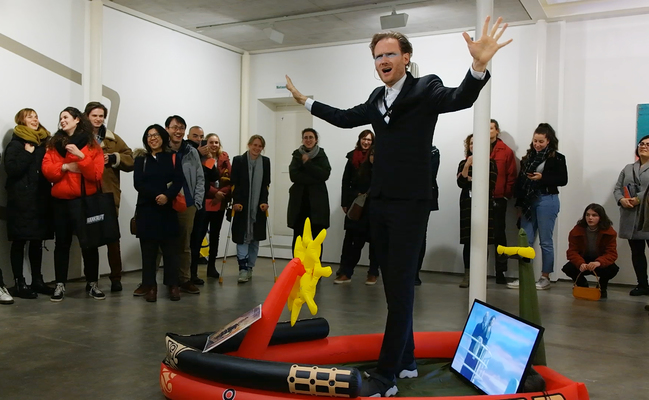Revolving Histories (#bangbang-0043)
Tumaroh's Heart will Go on
https://till-langschied.com/







Tumaroh's Heart will Go on
(2020)
https://till-langschied.com/
Tags
2020
Video 16:9
Karaoke
Pop culture
Queer
Entertainment
Emblematic
Activating
Exhibition object
Exhibition space

In his performance "Tumaroh's Heart will Go on", Till Langschied uses a pop-cultural reference that has been massively inscribed in the collective consciousness since the late 1990s and is instantly recognizable. In 1998 - shortly before the mass spread of the internet and platforms such as YouTube - James Cameron arranged Cate Winslet and Leonardo DiCaprio on the bow of the unsinkable ship in "Titanic".
"I'm flying, Jack!" is modern film history and has been reproduced in endless parodies and quotes in the media canon. What is exciting here is how low-threshold the internet, which emerged shortly afterwards, made the imitation and publication of such scenes.
Langschied's avatar Tumaroh repeatedly sings Celine Dion's iconic "My Heart will Go on" in this performance. The audience is encouraged to sing along to create a communal moment of remembrance. The constant repetition, combined with the children's toy setting (in which a video loop of Titanic parodies can also be seen on a screen), creates an abstruseness that is both disturbing and humorous at the same time.
But what happens to the "big" emotions of such a scene through permanent repetition? The postmodern philosopher Fredric Jameson attests to the postmodern pastiche's emptying of all content. Everything is now just part of a reference system in which hierarchies of values and claims to originality must fail. Repetition creates its own reality, in which everything ultimately becomes an object and thus (in a late capitalist reality) a commodity.
"I'm flying, Jack!" is modern film history and has been reproduced in endless parodies and quotes in the media canon. What is exciting here is how low-threshold the internet, which emerged shortly afterwards, made the imitation and publication of such scenes.
Langschied's avatar Tumaroh repeatedly sings Celine Dion's iconic "My Heart will Go on" in this performance. The audience is encouraged to sing along to create a communal moment of remembrance. The constant repetition, combined with the children's toy setting (in which a video loop of Titanic parodies can also be seen on a screen), creates an abstruseness that is both disturbing and humorous at the same time.
But what happens to the "big" emotions of such a scene through permanent repetition? The postmodern philosopher Fredric Jameson attests to the postmodern pastiche's emptying of all content. Everything is now just part of a reference system in which hierarchies of values and claims to originality must fail. Repetition creates its own reality, in which everything ultimately becomes an object and thus (in a late capitalist reality) a commodity.
automatically translated from german

Additional
Link to video: https://vimeo.com/ 420352147
Password: Celine

Museumsnacht Basel
place: Kunstraum Riehen, Riehen
KuratorIn: Seiler, Kiki
Dokumentationstyp: Dokumentation einer Performance/Aktion / Documentation of a performance/action
Alternative
Neben der Videodokumentation gibt es das Setting und den gezeigten Videoloop von Titanitc-Parodien

Medium
Video 16:9
Dauer: 15:53 min



